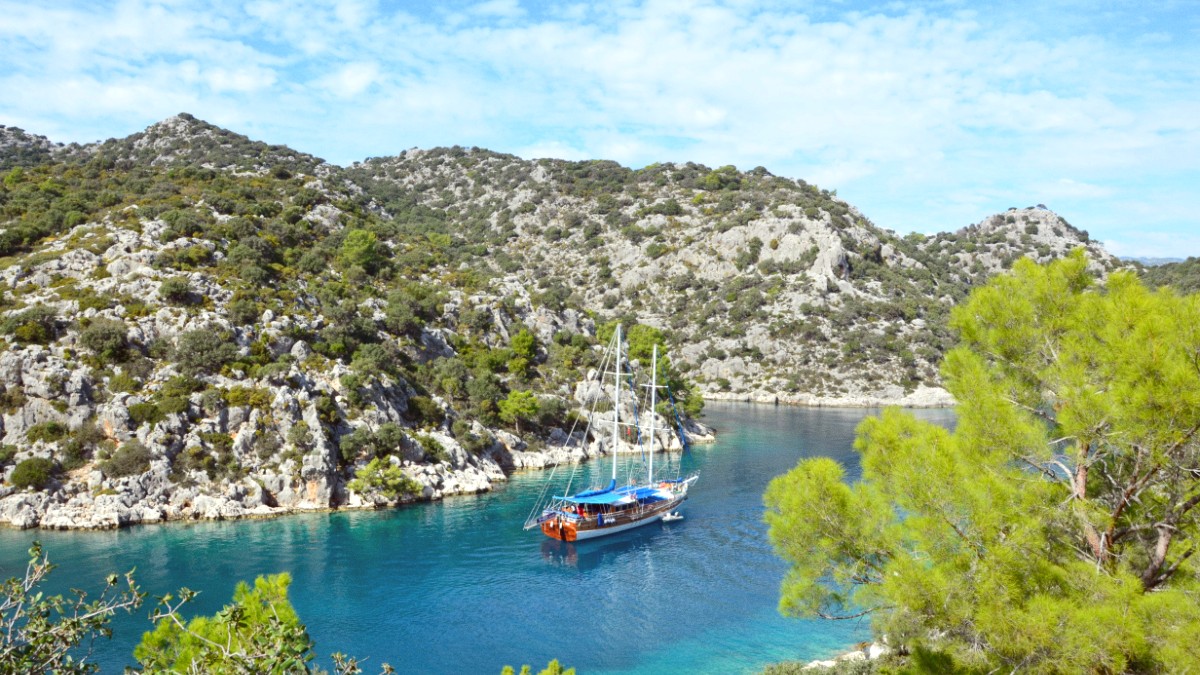
Mediterranean Coast, Turkey
Turkish cuisine originates from the Ottoman Empire's imperial kitchen, drawing inspiration from Central Asian, Middle Eastern, and Mediterranean traditions.
It is a fusion, valuing simplicity in preparation, allowing natural flavors of ingredients to shine. Meals often include mezes, grilled meats, and olive oil dishes.
Turks are known for warm hospitality. Restaurant owners may offer complimentary tea, coffee, or dessert.
Fresh bread served with almost every meal. Forks, knives, and spoons are typical; street foods like döner or lahmacun are eaten by hand.
Meals are social events. Alcohol is available in most tourist restaurants; Rakı and local beers are traditional.
Vertically roasted meat, thinly sliced, served in warm bread (dürüm) or on a plate with rice and salad.
Widely available from street vendors and small restaurants.
Long, hand-minced meat kebabs grilled on skewers. Adana is spicy, Urfa is milder.
Seek them out in specialized kebab restaurants (kebapçı).
Grilled fish like levrek (sea bass) or çipura (sea bream), calamari, and prawns.
Waterfront restaurants along the marina or promenade specialize in these.
Layers of filo pastry with nuts and syrup, or confectionery made from starch and sugar with various flavors.
Stretchy Turkish ice cream; savory Turkish flatbread filled with cheese, spinach, or meat.
Concentrated around Netsel Marina and luxury hotels. Offer sophisticated menus, upscale seafood, and international fusion cuisine. Expect higher prices and elegant ambiance.
Plentiful along the Marmaris promenade, town center, and Icmeler. Offer traditional Turkish and popular international dishes. Many have outdoor seating with sea views.
Local lokantas offer home-style Turkish food. Kebab shops for quick, affordable meals. Street vendors sell döner, lahmacun, simit.
Food stalls selling snacks, Turkish delight, and spices.
Excellent for local experience.
Fresh produce, cheeses, olives, sometimes prepared foods. Good for self-catering.
Experience local life.
Pizza, Pasta
Chinese, Indian
Comfort food
Other cuisines
Turkey is a Muslim-majority country; most meat served is halal. Assume traditional Turkish restaurants follow halal principles.
Generally available.
Kosher food is generally not available. Travelers needing kosher meals should bring their own or choose self-catering.
Generally not available.
May not be readily available on menus. Direct communication with staff is essential.
Carry pre-written translation cards. A Turkish phrasebook with food glossary helps.
Local tour operators or private chefs offer classes, often starting with a market visit for ingredients.
Organized tours focusing on local street food or traditional eateries, introducing hidden gems.
Less common directly around Marmaris, but day trips to rural areas may offer visits to olive groves or honey producers.
The national drink, served in small, tulip-shaped glasses, consumed throughout the day.
A symbol of hospitality.
Strong, unfiltered coffee. Served in small cups, with grounds settling at the bottom (do not drink sediment).
Enjoy responsibly.
Try a traditional Turkish breakfast (Kahvaltı) at least once. It is a large, delicious spread that delivers a genuine taste of local morning customs.
Sample Rakı, an anise-flavored alcoholic drink. Mix it with water for its milky appearance, best enjoyed with mezes and fish.
Cool down with Ayran, a refreshing, salty yogurt drink. For a different taste, try Şalgam Suyu, a fermented, savory turnip juice.
For the bill, make a writing gesture or say "hesap lütfen".